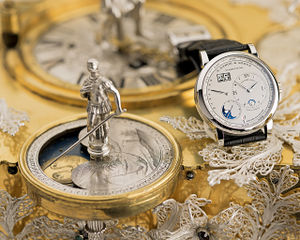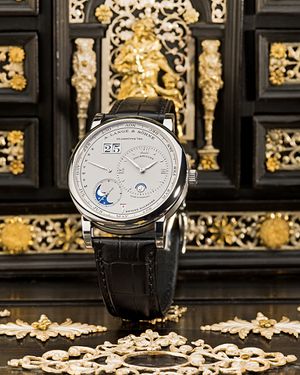Masterpieces for Eternity: Unterschied zwischen den Versionen
Keine Bearbeitungszusammenfassung |
Keine Bearbeitungszusammenfassung |
||
| (6 dazwischenliegende Versionen von 2 Benutzern werden nicht angezeigt) | |||
| Zeile 1: | Zeile 1: | ||
Glashütte, December 2012 | Glashütte, December 2012 | ||
[[Datei:LANGE 1 TOURBILLON EWIGER KALENDER auf astronomischer Tischuhr von Jeremias Pfaff quer.jpg|thumb|The LANGE 1 TOURBILLON PERPETUAL CALENDAR on a 17th century astronomical table clock]] | |||
[[Datei:LANGE TOURBILLON EWIGER KALENDER Ref 720.025 Grünes Gewölbe Dresden.jpg|thumb|LANGE 1 TOURBILLON PERPETUAL CALENDAR on a cabinet by Boas Ulrich, circa 1600.]] | |||
''With the imminent arrival of the LANGE 1 TOURBILLON PERPETUAL CALENDAR, one of the most innovative tourbillon watches with a perpetual calendar comes on sale. This exceptional timepiece is the latest in an artistically hand-crafted watchmaking tradition that has been nurtured in Saxony for centuries. All the more this is a reason to let it hold converse with masterpieces of the past in the collection of the “Historic Green Vault” in Dresden.'' | ''With the imminent arrival of the LANGE 1 TOURBILLON PERPETUAL CALENDAR, one of the most innovative tourbillon watches with a perpetual calendar comes on sale. This exceptional timepiece is the latest in an artistically hand-crafted watchmaking tradition that has been nurtured in Saxony for centuries. All the more this is a reason to let it hold converse with masterpieces of the past in the collection of the “Historic Green Vault” in Dresden.'' | ||
| Zeile 7: | Zeile 8: | ||
To optimise the integration of the calendar into the dial of the LANGE 1, with its off-centre composition, the Lange development team placed the month display on a rotating outer ring, for the first time in a wristwatch. Furthermore, all the displays of the perpetual calendar advance in jumps, so that they are clearly legible at all times. | To optimise the integration of the calendar into the dial of the LANGE 1, with its off-centre composition, the Lange development team placed the month display on a rotating outer ring, for the first time in a wristwatch. Furthermore, all the displays of the perpetual calendar advance in jumps, so that they are clearly legible at all times. | ||
However, this watch is not just a symbol of Saxon inventive genius. The hand-finishing of its 624 components also attests to the Saxon watchmaker’s roots in the local tradition of artistic craftsmanship. Nowhere can this be more impressively experienced than in the “Historic Green Vault”, Augustus the Strong’s treasury in Dresden Castle. This unique collection, reopened in 2006, is presented in nine sumptuously fitted rooms and | However, this watch is not just a symbol of Saxon inventive genius. The hand-finishing of its 624 components also attests to the Saxon watchmaker’s roots in the local tradition of artistic craftsmanship. Nowhere can this be more impressively experienced than in the “Historic Green Vault”, Augustus the Strong’s treasury in Dresden Castle. This unique collection, reopened in 2006, is presented in nine sumptuously fitted rooms and comprises over 3,000 unparalleled masterpieces of the jeweller’s and sculptor’s arts, displayed on hundreds of consoles against richly decorated walls, or free-standing on magnificent tables. The watchmaking masterpiece of the 21st century was displayed in an exciting dialogue with two of these historic treasures. | ||
comprises over 3,000 unparalleled masterpieces of the jeweller’s and sculptor’s arts, displayed on hundreds of consoles against richly decorated walls, or free-standing on magnificent tables. The watchmaking masterpiece of the 21st century was displayed in an exciting dialogue with two of these historic treasures. | |||
The astronomical table clock by [[Pfaff, Jeremias (1)|Jeremias Pfaff]], made in about 1690, can be regarded as a forerunner in spirit: it has no less than five dials, on which allegorical figures act as indicators of the time, and a complete calendar. Richly ornamented leaves and flowers in silver filigree set with gems mark this horizontal table clock as an object created for a princely collection. An even earlier example of | |||
the high quality of German silversmiths’ art is the lavishly crafted ebony cabinet with rich adornments in partly gilded silver, made by the virtuoso Boas Ulrich towards 1600. | |||
With their artistic constructions and | |||
fine decoration, Lange’s watchmakers and finishers pay a daily tribute in their work to the masters of a bygone age. They know that there can be no future without a past, and that technical progress without the | |||
nurture of tradition would have no soul. Thus [[A. Lange & Söhne / Glashütte i. Sa./en|A. Lange & Söhne]], as a partner of the [[Dresden]] municipal art collections, not only contributes to the conservation of the Historic Green Vault, but at the same time acknowledges the brand’s cultural origins in Saxony. | |||
[[Category:Watch-Wiki news archive 2012]] | |||
[[de:Meisterwerke für die Ewigkeit]] | [[de:Meisterwerke für die Ewigkeit]] | ||
[[en:Masterpieces for Eternity]] | [[en:Masterpieces for Eternity]] | ||
Aktuelle Version vom 9. Oktober 2017, 11:30 Uhr
Glashütte, December 2012


With the imminent arrival of the LANGE 1 TOURBILLON PERPETUAL CALENDAR, one of the most innovative tourbillon watches with a perpetual calendar comes on sale. This exceptional timepiece is the latest in an artistically hand-crafted watchmaking tradition that has been nurtured in Saxony for centuries. All the more this is a reason to let it hold converse with masterpieces of the past in the collection of the “Historic Green Vault” in Dresden.
The LANGE 1 TOURBILLON PERPETUAL CALENDAR was created for people who have farreaching ideas and consequently will only rely on a calendar designed to take the long view. The complication incorporated in the LANGE 1 meets this requirement effortlessly: not until the year 2100 will its perpetual calendar need to be corrected by one day, and the innovations in its construction set new benchmarks.
To optimise the integration of the calendar into the dial of the LANGE 1, with its off-centre composition, the Lange development team placed the month display on a rotating outer ring, for the first time in a wristwatch. Furthermore, all the displays of the perpetual calendar advance in jumps, so that they are clearly legible at all times.
However, this watch is not just a symbol of Saxon inventive genius. The hand-finishing of its 624 components also attests to the Saxon watchmaker’s roots in the local tradition of artistic craftsmanship. Nowhere can this be more impressively experienced than in the “Historic Green Vault”, Augustus the Strong’s treasury in Dresden Castle. This unique collection, reopened in 2006, is presented in nine sumptuously fitted rooms and comprises over 3,000 unparalleled masterpieces of the jeweller’s and sculptor’s arts, displayed on hundreds of consoles against richly decorated walls, or free-standing on magnificent tables. The watchmaking masterpiece of the 21st century was displayed in an exciting dialogue with two of these historic treasures.
The astronomical table clock by Jeremias Pfaff, made in about 1690, can be regarded as a forerunner in spirit: it has no less than five dials, on which allegorical figures act as indicators of the time, and a complete calendar. Richly ornamented leaves and flowers in silver filigree set with gems mark this horizontal table clock as an object created for a princely collection. An even earlier example of the high quality of German silversmiths’ art is the lavishly crafted ebony cabinet with rich adornments in partly gilded silver, made by the virtuoso Boas Ulrich towards 1600.
With their artistic constructions and fine decoration, Lange’s watchmakers and finishers pay a daily tribute in their work to the masters of a bygone age. They know that there can be no future without a past, and that technical progress without the nurture of tradition would have no soul. Thus A. Lange & Söhne, as a partner of the Dresden municipal art collections, not only contributes to the conservation of the Historic Green Vault, but at the same time acknowledges the brand’s cultural origins in Saxony.